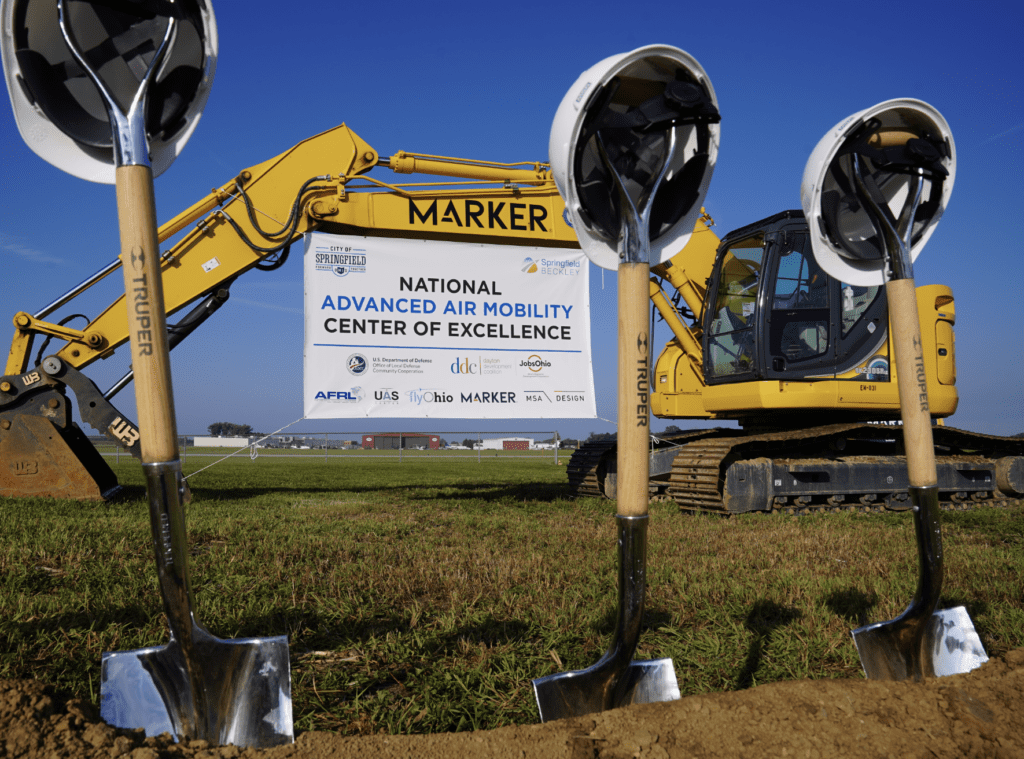
The groundbreaking ceremony for the National Advanced Air Mobility Center of Excellence at Springfield-Beckley Municipal Airport in Ohio took place on Aug. 23, 2022. (U.S. Air Force photo / Dennis Stewart)
Construction of a facility for development of advanced air mobility projects began last month in Springfield, Ohio. The National Advanced Air Mobility Center of Excellence, or NAAMCE, is funded by $9.35 million in investments from the city of Springfield, JobsOhio, and the Department of Defense. The groundbreaking ceremony took place during this year’s National Advanced Air Mobility Industry Forum.
The NAAMCE is intended to facilitate collaboration between the Air Force Research Laboratory (AFRL), NASA, industry leaders, and local colleges and universities, along with the Ohio Unmanned Aircraft Systems Center. The facility will support development of projects related to advanced air mobility, including electric vertical take-off and landing (eVTOL) aircraft, according to the announcement by the AFRL.
In addition to military applications, eVTOLs offer a range of potential use cases such as medical transport and humanitarian and disaster relief missions.
The USAF’s AFWERX program encourages innovations in aerospace such as new and advanced types of aircraft. The program initiated a market research effort targeting development of high-speed VTOL aircraft, awarding a Phase 1 contract to 11 companies including Jaunt Air Mobility, Whisper, Horizon Aircraft, and Bell Textron. The Phase 2 contracts are likely to be awarded in early 2023.

The above photo features Horizon Aircraft’s high-speed VTOL aircraft concept. (Photo courtesy of Horizon Aircraft)
The AFWERX Agility Prime initiative is another example of the USAF’s efforts to encourage developments in commercial eVTOL aircraft through coordination with industry. Agility Prime, according to the AFRL’s release, is “intended to reduce the bureaucratic, regulatory and financial burdens of developing and certifying eVTOL aircraft with the military, NASA and the Federal Aviation Administration.”
During a keynote address at the NAAMCE groundbreaking ceremony, retired Col. Joe Zeis, Aerospace and Defense Adviser for Ohio Governor Mike DeWine, remarked that advanced air mobility (AAM) is one of the most transformative technologies in aerospace today. He also added that in order to remain a leader in the aerospace industry, the state of Ohio must facilitate relevant research; establish and grow a STEM-educated workforce; participate in organizational collaborations; and expand installations of federal aerospace facilities.
Bryan Heck, Springfield’s city manager, expressed his confidence in the region’s position as a leader in eVTOL technology. “Springfield is at the cutting edge of a technology that is going to lead us into the future. [NAAMCE] builds on the already existing infrastructure that has taken some time but has quickly taken off.”
Springfield, Ohio, offers existing infrastructure and affordable cost of living, both of which make it an attractive city for the growing AAM industry.
The commander of the Air Force Research Laboratory, Maj. Gen. Heather Pringle, spoke during the National AAM Industry Forum about the Air Force’s priorities for developing the next generation of air and space vehicles. “What AFWERX has done with Agility Prime is they have capitalized on the fast-paced industry technology advancements, and they have followed it up trying to nest the military requirement and a piece of it and not hindering in any way the commercial development,” she remarked.
Last month, the USAF awarded a new contract to support eVTOL pilot training developments. The recipient, a company called Aptima, is coordinating with the Air Education and Training Command’s Detachment 62 (Det 62) that supports the Agility Prime program. Aptima has previously worked with the AFRL to develop a technology that can objectively measure pilot performance via flight simulators. Det 62 will assist in researching and determining pilot proficiencies and training requirements specific to eVTOL aircraft.